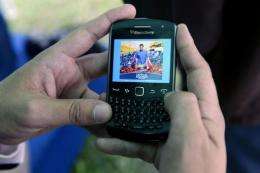Venezuelan election heats up via social media

With tweets, Facebook pages and YouTube videos, Venezuelan President Hugo Chavez and rival Henrique Capriles are waging an online battle ahead of the country's October 7 elections.
Some 12 million Venezuelans—or 41 percent of the population—surf the Internet, making it one of the most connected countries in Latin American.
Chavez, the leftist leader who has held power since 1999, easily wins the Twitter war with 3.3 million followers of his @chavezcandanga account—second only to US President Barack Obama among world leaders.
"(Twitter) is his main social media weapon," Carlos Jimenez, director of the firm Digital Tendencies, told AFP.
While the president continues to campaign at huge rallies and makes lengthy television appearances, he has used Twitter to assail Capriles, as well as announce new laws and rail against the United States.
Capriles, who trails Chavez by 15 points in the latest opinion polls, has 1.1 million Twitter followers and uses the @hcapriles handle.
The former governor of Miranda state is a prolific tweeter, writing more than a dozen messages per day to criticize his challenger or reach out to supporters.
"The candidate of the past is just a screen. All chatter, hours and hours of lies on TV, but Venezuela has woken up and the future is now!" he tweeted recently.
Fran Monroy, a Venezuelan journalist, said Capriles has managed to get more re-tweets than his rival.
Capriles and his team, who claim that Chavez unfairly uses state media and public funds as he seeks to secure a third term, have expanded their presence by using Facebook, YouTube and the photo-sharing website Instagram.
In an effort to gain greater reach, the Capriles campaign even created a Blackberry smartphone application, hoping it will be downloaded by 300,000 people.
Not to be one-upped, the Chavez camp put up a Facebook page titled "ChavezCorazonPatria" (ChavezHeartFatherland) where potential voters can read about the government's platform on issues, watch campaign videos and upload photos.
Capriles has made a more aggressive use of social media because he is targeting young middle class voters, as well as less wealthy Venezuelans who connect to the web with mobile phones, said Edixela Burgos, communications professor at Central University of Venezuela.
But "this does not necessarily translate into more votes," Burgos said. "They are tools to get to more voters but to mobilize people you still need to use traditional methods."
Last month, Chavez told AFP he had an "irreversible" advantage over Capriles, who is counting on undecided voters to help him come out on top.
If Chavez, who has declared himself "free" of the cancer he was diagnosed with over a year ago, wins and serves out his full term, he could rack up 20 years in office.
(c) 2012 AFP



















